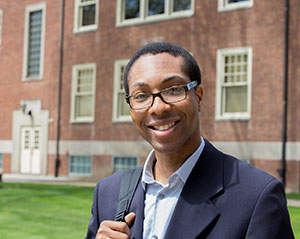 After graduating from Virginia Tech in 2005, MA student Greg Jones felt called to seminary. More than a decade later—and after working as a production coordinator of a closed captioning company—he enrolled at Pittsburgh Theological Seminary. “I think that God used the years in between college and seminary to develop a better character in me, which shows me, yet again, to trust in God’s timing, and that it is okay to wait for God!”
After graduating from Virginia Tech in 2005, MA student Greg Jones felt called to seminary. More than a decade later—and after working as a production coordinator of a closed captioning company—he enrolled at Pittsburgh Theological Seminary. “I think that God used the years in between college and seminary to develop a better character in me, which shows me, yet again, to trust in God’s timing, and that it is okay to wait for God!”
Although a generous financial aid package and the Seminary’s location were influencers in Greg’s decision to attend PTS, he says that the Seminary’s environment was the deciding factor. “The Seminary allows someone to figure out what he or she really believes about God, and what he or she believes about believers who are both much like themselves and those who are totally different from them!”
Greg continues, “I’ve seen how this seminary is open to listening to different perspectives across denominational and sociopolitical lines. Further, I’ve seen how Pittsburgh Seminary actually provides opportunities for the individuals who hold such diverse perspectives to share the same space—in classrooms, worship, civil debates, and daily life.” This kind of “figuring out” environment is important to Greg. “I think the environment here allows us to look at, love, and challenge each other to be who God created us to be,” he says.
As a student, Greg served on the search committee who earlier this year recommended Ken Woo as assistant professor of church history at PTS. Last year Greg studied church history and came to appreciate the subject. “Church history connects believers over time and space,” he says. “It reminds us that we are not the first group of people to face bewildering decisions about how to follow Christ in an imperfect world. History is filled with people who took risks following their faith—risks that led some to success and some to failure.” This knowledge is encouraging, he says, because it reminds us that we are not alone in our successes and failures—often, someone else has already faced a similar situation in an age before ours and we can learn from their ventures.
This summer Greg also studied Greek—though that’s not required for his denomination. “I think studying the biblical languages is central to seminary study, and understanding the Bible,” he says. As a leader of adult Sunday School at First Baptist Church of Bridgeville, Greg has applied much of his seminary studies to his lesson plans. “Thanks to the Old Testament courses I took, I always try to establish how the geographical context of Bible passages can affect how we read them. Additionally, I’m able to introduce Hebrew and Greek words, and sometimes phrases, into lessons in order to demonstrate the deeper meanings of some passages that English cannot capture. Because of the systematic theology and ethics courses, I often pose a question for our class to meditate on that is tied to our real life experiences.”
Following graduation, Greg plans to continue sharing what he’s learned at PTS to expand the educational ministries at First Baptist, as well as earn his doctorate and eventually teach at a theological school. “Serving on the faculty search for the history candidate was an instructive and encouraging selection process since I might go through a similar process myself in the future,” Greg says.
